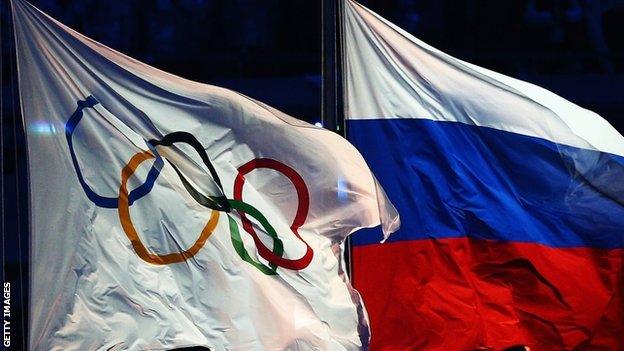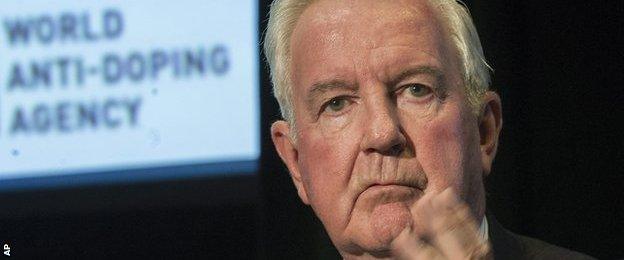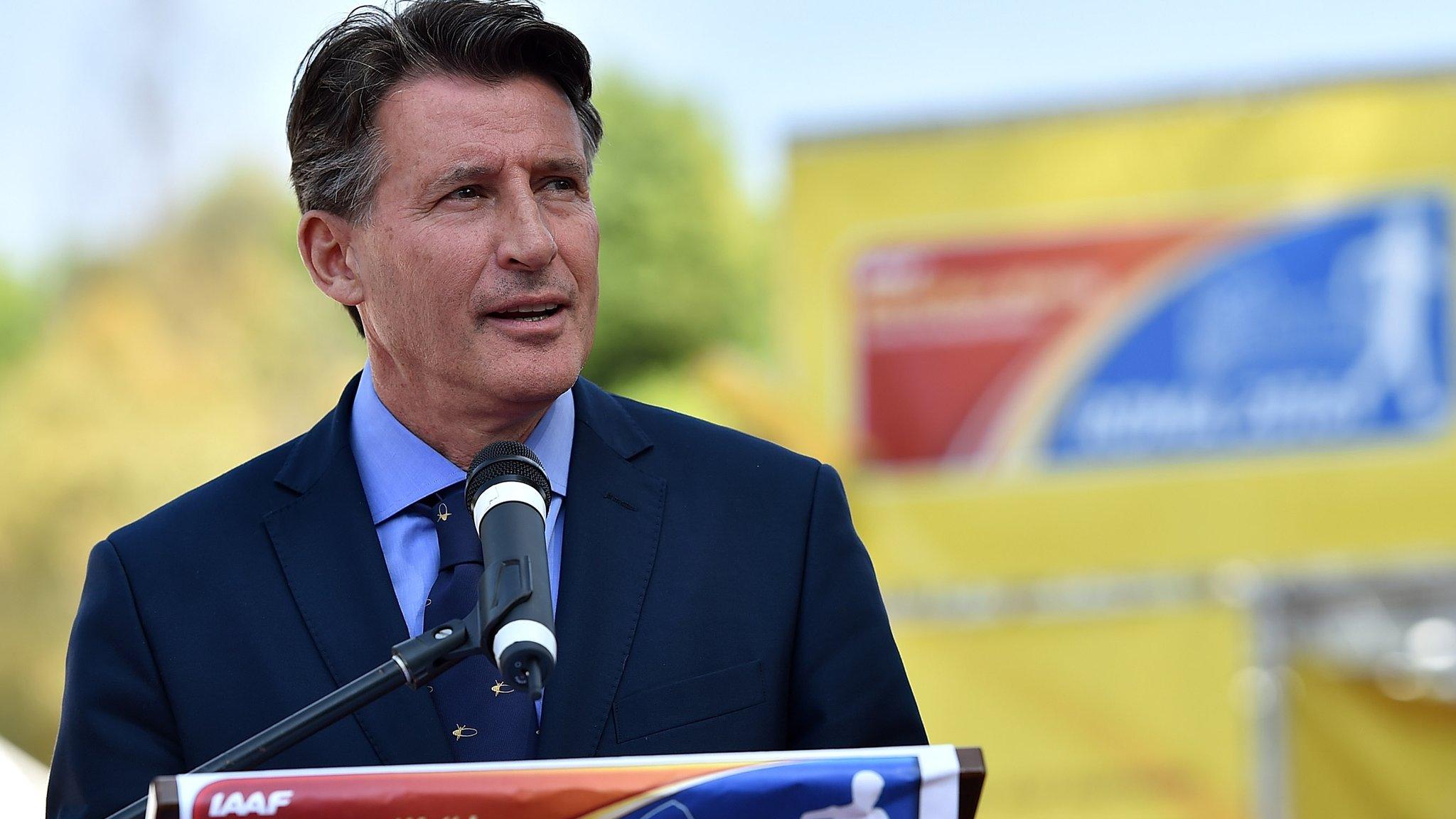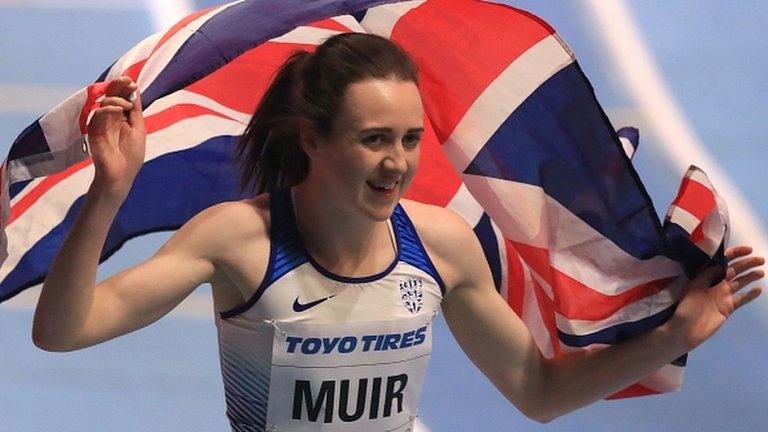Doping: International Olympic Committee backs 'strong' IAAF stance on Russia
- Published

Friday's decision by the International Association of Athletics Federations means Russian track-and-field athletes remain banned from the Olympics
The International Olympic Committee has backed the "strong stance" taken by athletics chiefs in upholding Russia's ban from international competition.
The IAAF decided on Friday not to lift the suspension, which was imposed after accusations of state-sponsored doping.
It means Russia's track-and-field team is suspended from the Rio Olympics, though athletes can compete as neutrals if they prove they are clean.
The IOC said the ruling was in line with its "zero-tolerance policy".
It has the power to overturn the IAAF's decision but vice-president John Coates said on Saturday he would be "very, very surprised" were that to happen.
The IOC will meet in Lausanne on Tuesday.
It said in a statement it "full respected" the IAAF's position, adding: "The eligibility of athletes in any international competition including the Olympic Games is a matter for the respective international federation."
Russian President Vladimir Putin has described the ban - imposed in November - as "unjust and unfair".
'No cultural change' in Russia

Sir Craig Reedie was appointed Wada president in November 2013
A taskforce studying reforms in Russia acknowledged on Friday that "significant progress" had been made but said the "deep-seated culture" of tolerance of doping "appears not to have changed".
That followed a report by the World Anti-Doping Agency (Wada) that said anti-doping officials in Russia were being stopped from testing athletes, and were also being threatened by security services.
Wada president Craig Reedie said there had been "no cultural change" in Russia since its athletes were banned and the IAAF ruling should send "a strong message" to other sports.
The IOC said Tuesday's meeting would address those countries whose national anti-doping organisation has been declared non-compliant by Wada.
It aims to implement additional testing measures for Olympic competitors from such countries.
Russians launch criminal case
Russian investigators announced on Saturday they have begun a criminal case against the former head of the country's anti-doping laboratory, who alleged the government and security service were involved in cover-ups.
The powerful Investigative Committee said it had started criminal proceedings against Grigory Rodchenkov for "abuse of power".
Rodchenkov, who has fled to the United States, last month made claims of an elaborate doping cover-up, external at the 2014 Sochi Olympics, with the close involvement of the sports ministry and the FSB security service.
A programme aired on German public broadcaster ARD last week - based in part on documents from Rodchenkov - alleged Russian authorities had covered up doping cases despite calls for reform.
Russian officials have criticised Rodchenkov for making the allegations. A statement read: "Through his actions, Rodchenkov caused substantial damage to the legally protected interests of the state."
It also accused him of "trying to conceal shortcomings and violations in his activities", violating "Russia's international interests" and discrediting the country's anti-doping policy.
IAAF's Rune Andersen: "A hundred negative tests does not mean that an athlete is clean"
'It's a very, very tricky moral maze'
UK Athletics chairman Ed Warner accepts the IOC is in a difficult position but urged it not to bow to pressure to allow Russian athletes to compete in Rio.
"What is being revealed is that many other Russian sports are subject to the same corruption," Warner told BBC Radio Four's Today programme.
"The IOC are going to be under inordinate pressure to cave in and allow the Russians back. I sincerely hope they don't do that because what we have seen is that clean athletes have been cheated for many years by state-sponsored, systemic cheating and it is terrible and goes to the heart of confidence in sport.
"It's a very, very tricky moral maze but what we have seen over the last year is evidence that the vast majority of Russian athletes are caught up in this system, whether they inadvertently have been treated by doctors that have been doping them without them knowing or not, who knows?
"So we're talking here about the vast majority deserving to be punished, and if a few innocent athletes unfortunately are caught up in it then maybe this is the wake-up call that Russia needs."
Warner claimed the Russian government could 'bankroll' the legal case of pole vault star Yelena Isinbayeva as she fights to be allowed to compete in Rio.
'Cheats are thieves'
British javelin record holder Goldie Sayers, meanwhile, says drug cheats stop clean athletes from "knowing how good you are".
Sayers was fourth at the 2008 Olympics, but could yet be promoted as silver medallist Maria Abakumova recorded a positive result in a re-test.
"The cheats are thieves," the 33-year-old told BBC Radio 5 live.
She added: "If an athlete is going to be cheating they need to be tested in the winter months. I like to remain naive, otherwise you become quite bitter."
- Published17 June 2016

- Published3 March 2018
